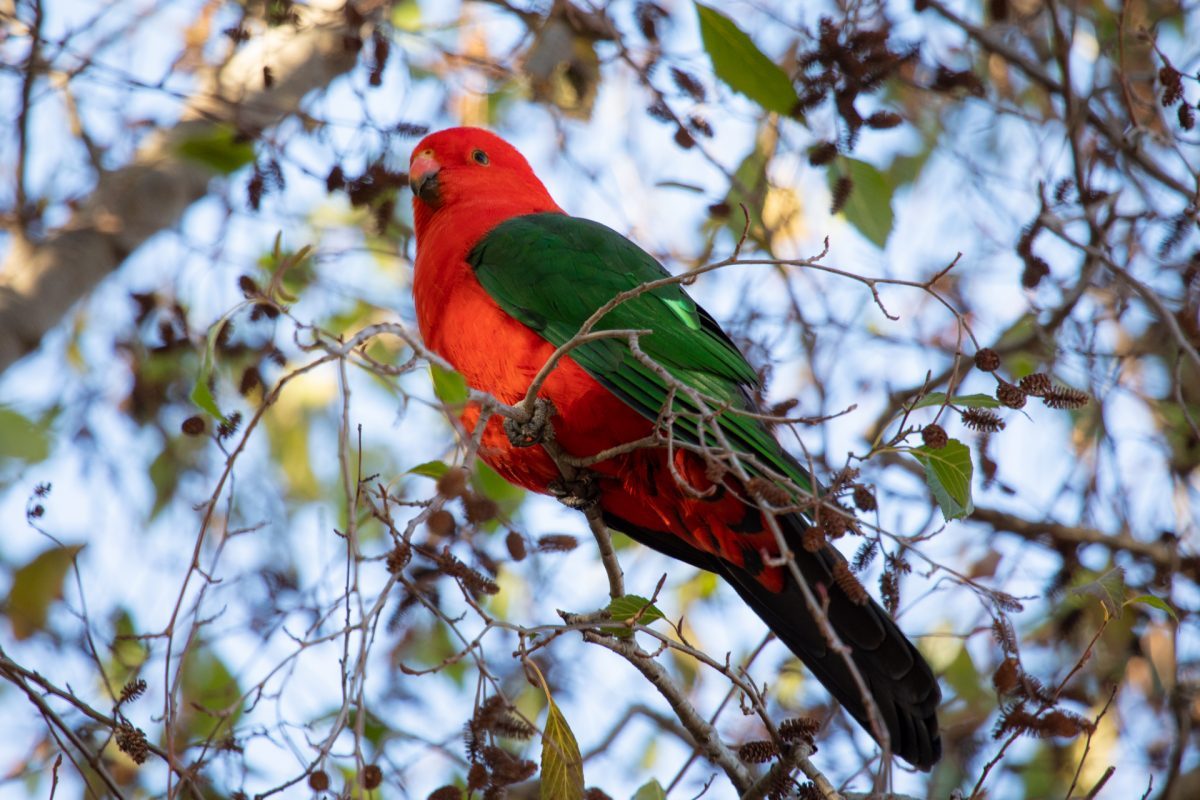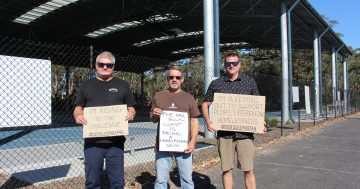
How an Australian king parrot should look. This one was photographed in Canberra, perched high in the gum tree with bright coat and eyes. Photo: Michelle Kroll.
A fast-spreading disease is believed responsible for the death of dozens of king parrots on the NSW South Coast.
Local WIRES wildlife volunteers have been called out to the Bega Park area, opposite the showground, to try and save the remaining sick birds showing signs of the fast-spreading disease known as Spironucleosis.
Dead or dying parrots have also been found at Cobargo.
WIRES vet Tania Bishop said she believed the birds were showing signs of the highly contagious organism that particularly affected king parrots at this time of year when food was scarce.
It was commonly found in juvenile birds congregating on a feeding table or a bird bath.
“So feeding wild parrots or any other birds is not recommended as the organism can be passed on when they flock together around bird feeders,” Dr Bishop said.
She said symptoms of the disease included emaciation and wasting, weakness, inability to fly and often a staggering walk when birds were on the ground.

WIRES volunteer Marianne Kambouridis is caring for this King Parrot, which was stricken by the disease. Photo: Marianne Kambouridis.
WIRES wildlife volunteer Marianne Kambouridis from Bega, who is currently caring for a stricken parrot, said she believed many more had been hit by the disease. However, as they were probably discarded rather than taken to the vet or WIRES there was no way of keeping an accurate count.
She had even found a dead raven recently that looked to have been affected by the disease.
Ms Kambouridis said the younger parrots were more likely to catch the disease because, after being weaned by mum, they were left to search for food themselves and would often go to the easiest source – a feed table.
“It is possible to save these affected birds if we can get them to the vet as quickly as possible,” she said.
“We encourage members of the public to please report any birds that appear unwell to WIRES so we can rescue them and give them a better chance of survival.”
Ms Kambouridis, who has been a WIRES volunteer for more than two years, said the ailing parrots needed a lot of care before they could be returned to the wild.
It can take up to eight weeks for them to recover via TLC and medication.
“With the ones I’m looking after, I keep them on a heat pad at night so they stay warm and during the day, they go outside into my 20 by 20 enclosed orchard. It’s wonderful to see them when they start to feel better, climbing and eating the fruit,” she said.
Ms Kambouridis said there were three things people could do to help stop the spread of Spironucleosis.
- Don’t cut your grass too low. Leave longish patches so birds can do what comes naturally – forage
- Plant more native shrubs around your home, particularly eucalypts
- Don’t leave water out for birds – they will find their own water
“Unless we’re in a really bad drought, you don’t need to put water out for them. Those bird baths can just help spread the disease really quickly. Birds will normally find water if they’re thirsty, from puddles, lots of other places,” she said.
Ms Kambouridis also encouraged people to volunteer with WIRES, saying it was one of the best things she had ever done.
“People don’t realise that volunteers can do many things with us,” she said. “We always need people, for example, to just pick up animals from the vet. They don’t have to start at the deep end. The best idea is to join up and get involved and find out what you’re interested in.”
She said people who found a stricken parrot and were confident in handling wildlife should wrap the bird up in something warm and take it to the vet. Other people should make a note of where they found it and call WIRES on 1300 094 737.








